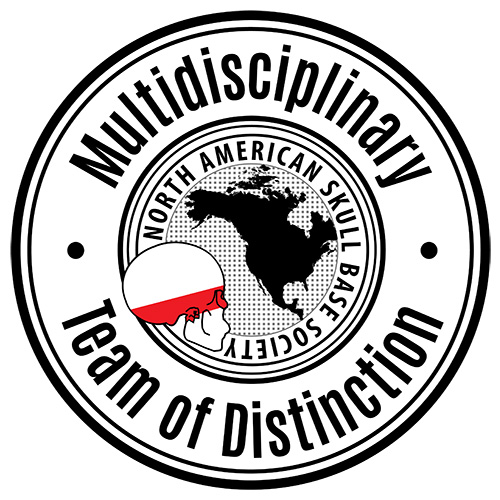Cranial base surgery has a long tradition at the University of Pittsburgh. The UPMC Center for Cranial Base Surgery—under the current direction of Georgios Zenonos, MD, in the Department of Neurological Surgery, and Carl Snyderman, MD, MBA, Eric Wang, MD, and Garret W. Choby, MD, in the Department of Otolaryngology—is the first skull base center to be established in North America and has pioneered both transcranial microscopic and endoscopic endonasal approaches to the skull base and brain.
Neurotology expertise is provided through collaboration with the neuro-otology division of the Department of Otolaryngology, led by Peter Santa Maria, PhD, along with Greg Basura, MD, PhD, and Philip Perez, MD, to provide complex care for lateral skull base pathologies. Additional pediatric skull base expertise is provided by Cody Nesvick, MD in neurosurgery and Amanda Stapleton, MD, in otolaryngology, caring for all types of pituitary and skull base tumors in children. This combined team concept of adult skull base and pediatric surgeons provides a unique group expertise.
Finally, radiosurgery plays a key role in skull base disease, leading to regular collaboration with Costas Hadjipanayis, MD, PhD, director of the UPMC Center for Image-Guided Neurosurgery, Ajay Niranjan, MD, and L. Dade Lunsford, MD, who established the first Gamma Knife center in North America at UPMC in 1987 and was also the first to introduce radiosurgery for the non-operative treatment of skull base tumors.
Experts at the UPMC Center for Cranial Base Surgery continue to lead the field of minimally invasive brain surgery by developing new techniques, tools and approaches that have made it possible to access many tumors, regardless of size. Since 1997, more than 5,000 endonasal surgeries have been performed in adults and children, making UPMC one of the busiest centers in the world for the surgical treatment of tumors of the pituitary region and cranial base. By combining this innovative approach with other minimally invasive approaches, such as transorbital and endoscopic-assisted retromastoid and keyhole approaches, as well as the full complement of standard skull base approaches, the team at UPMC provides a full array of options for cutting-edge treatment of skull base disease. In addition, the Center for Cranial Base Surgery has also been designated as a Pituitary Tumor Center of Excellence by the UPMC Health Plan, setting the standard for pituitary tumor treatment in the region. This designation is based on high volume practice with regular metrics which uphold a high standard of care for the entire UPMC system.
Drs. Snyderman, Zenonos, Wang and Choby, along with oculoplastic surgeon Tonya Stefko, MD, from the Department of Ophthalmology, and Drs. Santa Maria and Perez comprise a team of experts in cranial base surgery, advancing patient care through clinical outcomes studies, in-depth anatomical study, molecular science and genetics research and an international training program. Research activities are coordinated by Benita Valappil, MPH, clinical research director, and include participation in multicenter trials, banking of tumor tissue for genetic and molecular research, and maintenance of clinical research database. The UPMC Cranial Base Center continues to push the field of skull base surgery forward with a combination of clinical innovation and basic science research. Via collaboration with bench researcher at UPMC and other institutions, the center is developing new ways to understand and treat skull base tumors, using outcomes-based data combined with in depth molecular and genetic tumor sequencing to provide individualized care for skull base disease.
Supported by expert advanced practice practitioners Rachel Wrigley, Jada Dooley, Shannon Casey, Destiny Seay and a highly experienced subspecialty nursing team, patients are evaluated and guided through even the most complex, multidisciplinary care, provided to patients throughout the region, across the United States and around the globe.
The concept of team surgery allows the center to select the best surgical approach for each tumor, with a surgical plan designed around the particular needs of the individual patient. Treatment is designed to offer the best surgical outcome with the least side effects and maximal preservation of function. A full array of transcranial approaches, minimally invasive keyhole approaches and endoscopic endonasal approaches are routinely applied with proven and studied success.
The UPMC Center for Cranial Base Surgery is also a major teaching and research destination for surgeons and other health care professionals looking to learn more about these techniques. Faculty teach three CME courses yearly at UPMC, featuring live surgery and hands-on laboratory work. They also travel the world teaching these procedures to the next generation of skull base surgeons.
The center has also been designated as a “Multidisciplinary Team of Distinction” by the North American Skull Base Society. This designation is based on meeting NASBS membership criteria for multidisciplinary participation.

